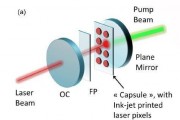 2016-05-04
2016-05-04
Since lasers were invented more than 50 years ago, they have transformed a diverse swath of technology -- from CD players to surgical instruments.
Continue reading →
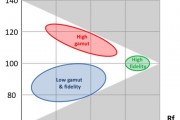 2016-04-25
2016-04-25
Having explored in my last post how we designed a source with very high fidelity, I would now like to discuss in more detail another class of so-called “color-enhancing” light sources. Today, I will make some general statements about this concept, and in a follow-up-post I will talk more specifically about how Soraa products uniquely deliver this enhancing experience.
Continue reading →
2016-04-21
A team of researchers from across the country, led by Alexander Spott, University of California, Santa Barbara, USA, have built the first quantum cascade laser on silicon. The advance may have applications that span from chemical bond spectroscopy and gas sensing, to astronomy and free-space communications.
Continue reading →
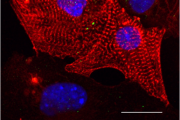 2016-04-20
2016-04-20
Scientists from MIPT’s Laboratory of the Biophysics of Excitable Systems have discovered how to control the behavior of heart muscle cells (cardiomyocytes) using laser radiation; this study will help scientists to better understand the mechanisms of the heart and could ultimately provide a method of treating arrhythmia. The paper has been published in the journal PLOS ONE.
Continue reading →
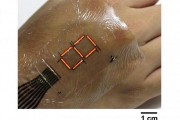 2016-04-19
2016-04-19
University of Tokyo researchers have developed an ultrathin, ultraflexible, protective layer and demonstrated its use by creating an air-stable, OLED display. This technology will enable creation of electronic skin (e-skin) displays of blood oxygen level, e-skin heart rate sensors for athletes and many other applications.
Continue reading →
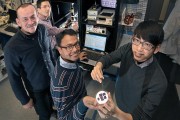 2016-04-11
2016-04-11
Harnessing the power of the sun and creating light-harvesting or light-sensing devices requires a material that both absorbs light efficiently and converts the energy to highly mobile electrical current. Finding the ideal mix of properties in a single material is a challenge, so scientists have been experimenting with ways to combine different materials to create "hybrids" with enhanced features.
Continue reading →
 2016-04-07
2016-04-07
The Fraunhofer Institute for Organic Electronics, Electron Beam and Plasma Technology FEP, Fraunhofer Institute for Applied Polymer Research IAP, Organic Electronics Saxony (OES) and Mareike Gast Industrial Design present the “Insect Project” as a highlight of flex+ Open Innovation at the OES LOPEC 2016 booth (Hall B0, Booth 320) and at the joint Fraunhofer booth (ISE, IAP, ISC, IVV) in Munich, Germany, April 6 – 7, 2016.
Continue reading →
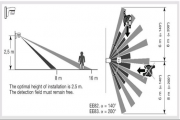 2016-04-07
2016-04-07
Don Barnetson, CTO of Lunera Labs outlines five major lighting control and sensor technologies currently on the market, and compares how each measures up in real-life lighting situations.
Continue reading →
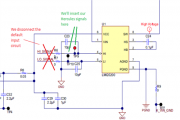 2016-03-31
2016-03-31
In my last blog post, I walked you through a hands-on project: dimming a lamp with a gallium nitride (GaN) power stage, a Hercules™ microcontroller and a scroll wheel. I covered setup, design and how to drive the power stage the right way.
Continue reading →
 2016-03-31
2016-03-31
LED lamps have recently hit the lighting market and attracted a lot of consumers’ attention. But the professionals of interior and exterior design have been using them for ages bringing out even the most unrealistic ideas. Let’s see what LEDs can do when they fall into hands of nonconformist creators.
Continue reading →
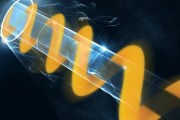 2016-03-30
2016-03-30
Using geometric phase inside lasers for the first time, researchers find a way to change the orbital angular momentum of laser beams.
Continue reading →
2016-03-29
A group of Spanish researchers from Autonomous University of Barcelona found that by photo-stimulating boar sperm with red LED lights through a 30 minute cycle could improve in vitro sperm fertilization performance, according to a paper the team submitted to Nature.
Continue reading →
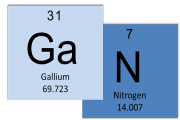 2016-03-23
2016-03-23
Sandeep Bahl of Texas Instrument stresses the importance of making reliable GaN material will largely rely on joint efforts in the industry to establish related standards in this blog entry.
Continue reading →
 2016-03-21
2016-03-21
Researchers at UT Southwestern Medical Center have determined that light reflectance spectroscopy can differentiate between malignant and benign prostate tissue with 85% accuracy, a finding that may lead to real-time tissue analysis during prostate cancer surgery.
Continue reading →
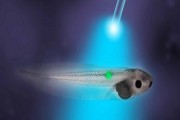 2016-03-18
2016-03-18
Tufts University biologists using a frog model have demonstrated for the first time that it is possible to prevent tumors from forming and normalize tumors after they have formed by using light to control electrical signaling among cells. The work, which appears online in Oncotarget on March 16, is the first reported use of optogenetics to specifically manipulate bioelectrical signals to both prevent and cause regression of tumors induced by oncogenes.
Continue reading →
 2016-03-18
2016-03-18
The Edinburgh Instruments applications team and Dr Gianluca Accorsi, a Research Fellow at CNR Nanotec in Lecce, Italy, worked on the photo-physical properties of Egyptian blue pigment using our Fluorescence Spectrometers.
Continue reading →
2016-03-17
The U.S. Department of Energy (DOE) has created a number of useful new resources to help stakeholders understand IES TM-30-15, which describes a new method for evaluating light-source color rendition.
Continue reading →
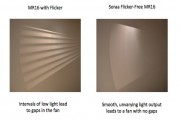 2016-03-14
2016-03-14
Soraa’s Chief Electronics Architect Laszlo Takacs explains two important stages in designing flicker-free luminaires.
Continue reading →
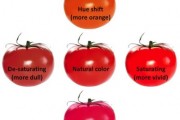 2016-03-08
2016-03-08
Soraa’s Chief Scientist Aurelien David explainsTM-30 color metrics in this latest blog entry.
Continue reading →
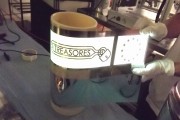 2016-03-07
2016-03-07
In more than three years of work European scientists finally made future lighting technology ready to market. They developed flexible lighting foils that can be produced roll-to-roll – much like newspapers are printed. These devices pave the path towards cheaper solar cells and LED lighting panels. The project named TREASORES was led by Empa scientist Frank Nüesch and combined knowhow from nine companies and six research institutes in five European countries.
Continue reading →
2016-03-01
Noah Horowitz is a senior scientist in NRDC's energy program gives an in-depth review of the latest DOE light bulb energy efficiency standards and its impact in the U.S. market.
Continue reading →
 2016-02-26
2016-02-26
Graphene, the two-dimensional powerhouse, packs extreme durability, electrical conductivity, and transparency into a one-atom-thick sheet of carbon. Despite being heralded as a breakthrough “wonder material,” graphene has been slow to leap into commercial and industrial products and processes.
Continue reading →
2016-02-23
New light bulb energy efficiency standards proposed by the U. S. Department of Energy (DOE) completed the gradual phase-out of inefficient everyday incandescent bulbs required under a 2007 law passed by a bipartisan Congress with industry support. And once all of America's approximately 4 billion lighting sockets contain energy-saving bulbs that meet the standards, U.S. consumers and businesses will save about $12.5 billion every year--and gain cleaner air and a healthier environment.
Continue reading →
2016-02-01
In this Natural Resource Defense Council blog entry, Allison Clements, Senior Attorney, Project for Sustainable Federal Energy Regulatory Commission (FERC) Energy Policy, New York sheds insights on how the U.S. Supreme Court’s recent ruling that gives FERC has both the authority and the duty to regulate demand response will have on green energy developments.
Continue reading →
 2016-01-29
2016-01-29
One of the benefits of automating control systems within buildings is the ability to customize services and personalize a user’s environment; the human machine interface (HMI) is the gateway to such controls. The addition of proximity sensing is an underutilized improvement to many interfaces in an automated building ecosystem, including thermostats, security-system keypads, monitors and elevator call buttons. Proximity sensors can improve the user experience, decrease power consumption, and increase the life of the liquid crystal display (LCD) and backlight.
Continue reading →
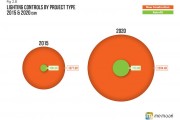 2016-01-27
2016-01-27
The latest bus-based lighting control products not only offer a reduced operating cost through energy efficiency gains and maintenance costs but also the actual cost of controls hardware is changing through the elimination of certain system components. This is just one of the findings from our recent report into the global market for Lighting Controls – //www.memoori.com/portfolio/smart-buildings-the-lighting-controls-business-2015-to-2020/
Continue reading →
 2016-01-15
2016-01-15
The US $112 billion global lighting market is undergoing a rapid transformation driven by technological change and the rules of the game continue to change for players across the industry.
Continue reading →
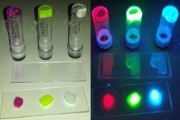 2016-01-13
2016-01-13
Scientists from Germany and Spain have discovered a way to create a BioLED by packaging luminescent proteins in the form of rubber. This innovative device gives off a white light which is created by equal parts of blue, green and red rubber layers covering one LED, thus rendering the same effect as with traditional inorganic LEDs but at a lower cost.
Continue reading →
 2016-01-13
2016-01-13
In this International Year of Light 2015 blog entry written by Abhijeet Phatak is a final year undergraduate student at the Department of Ceramic Engineering, Indian Institute of Technology (Banaras Hindu University), Varanasi, India, different lighting technologies paired with smartphones are explored.
Continue reading →
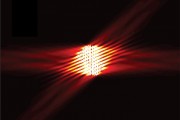 2016-01-11
2016-01-11
What do astrophysics, telecommunications and pharmacology have in common? Each of these fields relies on polarimeters — instruments that detect the direction of the oscillation of electromagnetic waves, otherwise known as the polarization of light.
Continue reading →
 2016-05-04
2016-05-04
 2016-04-25
2016-04-25
 2016-04-20
2016-04-20
 2016-04-19
2016-04-19
 2016-04-11
2016-04-11
 2016-04-07
2016-04-07
 2016-04-07
2016-04-07
 2016-03-31
2016-03-31
 2016-03-31
2016-03-31
 2016-03-30
2016-03-30
 2016-03-23
2016-03-23
 2016-03-21
2016-03-21
 2016-03-18
2016-03-18
 2016-03-18
2016-03-18
 2016-03-14
2016-03-14
 2016-03-08
2016-03-08
 2016-03-07
2016-03-07
 2016-02-26
2016-02-26
 2016-01-29
2016-01-29
 2016-01-27
2016-01-27
 2016-01-15
2016-01-15
 2016-01-13
2016-01-13
 2016-01-13
2016-01-13
 2016-01-11
2016-01-11